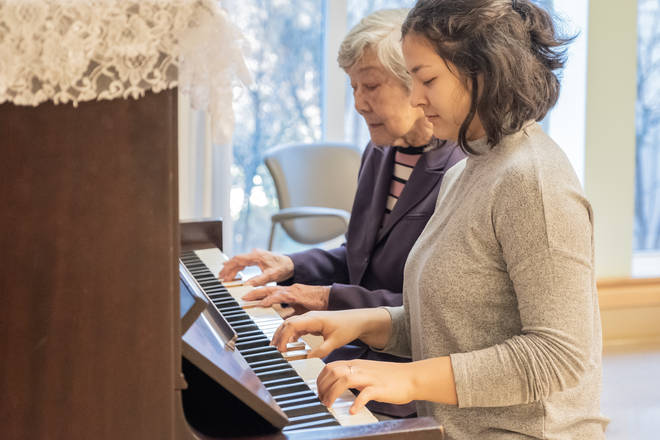This article is a music therapy and dementia research literature review. Study it to learn how to write similar articles and follow through to gain insights into how you can get expert essay writing help.
Music Therapy and Dementia Research Literature Review
Literature Review
Studied Progression of Alzheimer’s Dementia from a Neuroanatomical Point of View
Alzheimer’s dementia (AD) and its’ progression in the human brain has been widely studied and concluded upon by the community of neuroscientists. Starting with ischemia of the entorhinal region of the brain, tau and amyloid proteins migrate towards the hippocampus, entering the isocortex and eventually infiltrating and blocking communications between most neurons (Braak, Braak, & Bohl, 2008). The quantity of buildup and number of affected brain regions corresponds to the different stages of AD, which is how clinical differentiations and diagnoses are made.
The initial degradation of the entorhinal cortex corresponds to the earlier stages and onset of diagnosis of AD, marked largely by inability to learn, memorize, and think. Mild to moderate AD involves the destruction of hippocampal neurons with more tangible symptoms presenting. General confusion and communicational barriers impede and hinder several aspects of the individual’s personal or work life. The final stage of AD involves the severance of neurons in the isocortex- the individual does not recognize his friends or family (Braak et al., 2008).
Cortical Regions Activated in Response to Music Stimuli
Studies have also been done regarding the effects that musical stimuli have on the activation of specific cortical regions. Since the brain is such an intricate system that varies so widely across individuals, there is little consensus in regard to a concise and definitive pathway through which musical comprehension, emotion, and memory all follow. One of the main reasons that this is particularly challenging has to do with the quantifiability of the variables being studied. Music memory itself is defined as a biological reaction to an auditory stimulus, so there is no clear flow of this information that can be tracked via imaging.
Despite this, there is overwhelming support for the notion that the musical memory system is independent from other memory systems (Jacobsen, Stelzer, Fritz, Chételat, La Joie, & Turner, 2015). The left middle and inferior fronto-temporal (IFG) regions have been shown to activate upon the episodic retrieval of music through functional magnetic resonance imaging (fMRI) techniques (Jacobsen et al., 2015).
This means that subjects asked to recall specific and personal memories regarding musical compositions have higher blood oxygenation level dependent (BOLD) signals, or movement of blood, in these areas. The right hippocampus, left IFG, bilateral lateral temporal regions, and left precuneus are all activated in retrieval success for musical memory as well as melodic processing (Watanabe, Yagishita, & Kikyo, 2007). Though not entirely concise, generally there is a studied pathway that shows how music memory is processed and stored in the brain.
Music Memory Remains Intact in AD Patients
Consistent studies show that patients with AD in the later stages still have very high-functioning music memories (Jacobsen et al., 2015). The mechanisms by which music memories are formed and retrieved are seen to be independent of other common memory systems. This is seen not only in individuals with damage to only the music memory system, but also in individuals with damage to only other memory systems. These sorts of studies must be carried out through case studies and cannot just be broadly applied to the general population.
Individuals with AD were studied and given tasks to recall long-known music memory. Their brain scans showed the areas of activation when asked to perform tasks. Not only physiologically were the brain areas active in these subjects, but actual results were produced and expressed outwardly. These scans were compared with baseline individuals who had no history of AD. They showed consistency in that similar areas were being activated to produce similar outcomes.
Music memory brain areas that are intact and active in individuals with no AD or neurodegenerative disorders showed almost identical findings in those subjects with memory or AD-related deficits (Jacobsen et al., 2015). This shows that despite ischemia and protein buildup in those areas of AD brains, their ability to retain memories in regard to music and music systems remains largely intact.
Music Evokes Emotions in Individuals
Music and the act of listening to music is a complicated task that involves the conglomeration of multiple stimuli coming together to create a memory in the brain (Sutherland, 2012). This gathering of objective data creates a subjective response within the brain that is then executed by the body and interpreted outwardly as an emotional response. fMRI studies examining the brain in response to musical stimuli indicate that when individuals are listening to music, the pleasure and reward pathways defined in the brain become active (Agustus, Mahoney, Downey, Omar, Cohen, White, & Warren, 2015).
Studies conducted exposed subjects to resonant and dissonant music, both of which caused excitatory responses in the parts of the brain that are known to be activated during times of joy and happiness. The mesolimbic dopaminergic (ML-DA) system is what is often regarded as the reward pathway in the brain. It is heavily used in the study of addiction and drug-dependence but is relevant in observing the brain on music as well (Alcaro, Huber, & Panksepp, 2007). When people listen to music, ML-DA pathway activates, indicating that the brain is receiving this musical stimulus as a sort of reward.
AD Patients Reacting to Music
On the forefront of neuroscience research is a new concept examining the effectiveness of music as therapeutic treatment for individuals suffering from Alzheimer’s. One study was conducted on a group of individuals with late-stage AD by exposing them to musical stimuli several times a week for several weeks and then analyzing the levels of neurotransmitter chemicals in the blood.
Conclusions of this study showed that there was an increase in the amount of melatonin, epinephrine, and norepinephrine in each of the individuals’ blood samples. These chemicals are known to affect the overall mental state of an individual, so the overall change in quantity of them is indicative of a change in mental state in each of the individuals (Klotter, 2001).

A more involved study separated AD patients at a nursing home into two groups- one group was exposed to music during recreational time, while the other group was given puzzles to work on with no music being played. Upon simple observation of the individual’s behavior, those in the group exposed to music were generally happier, more alert, responsive, and were better able to recall memories from times in their past. The effects of the musical recreation session lasted long after the music was turned off, with patients mixing and mingling with an unforeseen energy in the AD ward of this particular home (Lord, & Garner, 1993).
Current Study
The specificity of how and why music memory remains intact in individuals with Alzheimer’s dementia complicates the methods by which it can be fully studied and understood. A lot of the information presented by neuroscience in regard to this topic is scattered and requires piecing together in order to understand the full effect. The areas in which AD destruction occur in the brain are synonymous with the areas of the brain that are responsible for memory and recall, so the studies indicating that patients with Alzheimer’s are able to recall music and its’ associated memory do not line up.
 This study will seek to explain what role, biologically and evolutionarily, music plays in order to explain why the brain would hold onto this particular function over all others and serve to improve the quality of life in AD patients by incorporating more music into treatment procedures. Based on previous studies and research done, the biological value that music provides people involves the emotions and pleasure it makes people feel.
This study will seek to explain what role, biologically and evolutionarily, music plays in order to explain why the brain would hold onto this particular function over all others and serve to improve the quality of life in AD patients by incorporating more music into treatment procedures. Based on previous studies and research done, the biological value that music provides people involves the emotions and pleasure it makes people feel.
References
- Athar, Shahid, et al. Health Guidelines from Quran and Sunnah. 8 June 2016, https://www.soundvision.com/comment/10543. Accessed 7 Oct. 2019.
- Attum, Basem. Cultural Competence in the Care of Muslim Patients and Their Families. 15 June 2019, https://knowledge.statpearls.com/chapter/0/40656?cv=1&utm_source=pubmed. Accessed 7 Oct. 2019.
- Attum, Basem. Cultural Competence in the Care of Muslim Patients and Their Families. 15 June 2019, https://knowledge.statpearls.com/chapter/0/40656?cv=1&utm_source=pubmed.
- Ciftci, Ayse, et al. “Mental Health Stigma in the Muslim Community.” Journal of Muslim Mental Health, vol. 7, no. 1, 2013, https://allianceforclas.org/wp-content/uploads/2013/10/mental-health-stigma-in-the-muslim-community.pdf. Accessed 8 Oct. 2019.
- Taheri, Nayer. Health Care in Islamic History and Experience. 1 May 2008, https://ethnomed.org/cross-cultural-health/religion/health-care-in-islamic-history-and-experience. Accessed 8 Oct. 2019.
- What Is Islam and Who Are Muslims? 2019, https://isogs.org/faqs/. Accessed 7 Oct. 2019.
Read More On
- The Health Inequalities Between Genders
- Gender perception: How media affects our perception on gender.
- HIV Reverse Transcriptase: Molecular Mechanisms of Inhibition and Resistance
- Ethical Justifications of Birth Control
- Ethical issues and biological aspects of chronic illness case study.
Do not hesitate to contact our professionals if you need help with a similar assignment.


